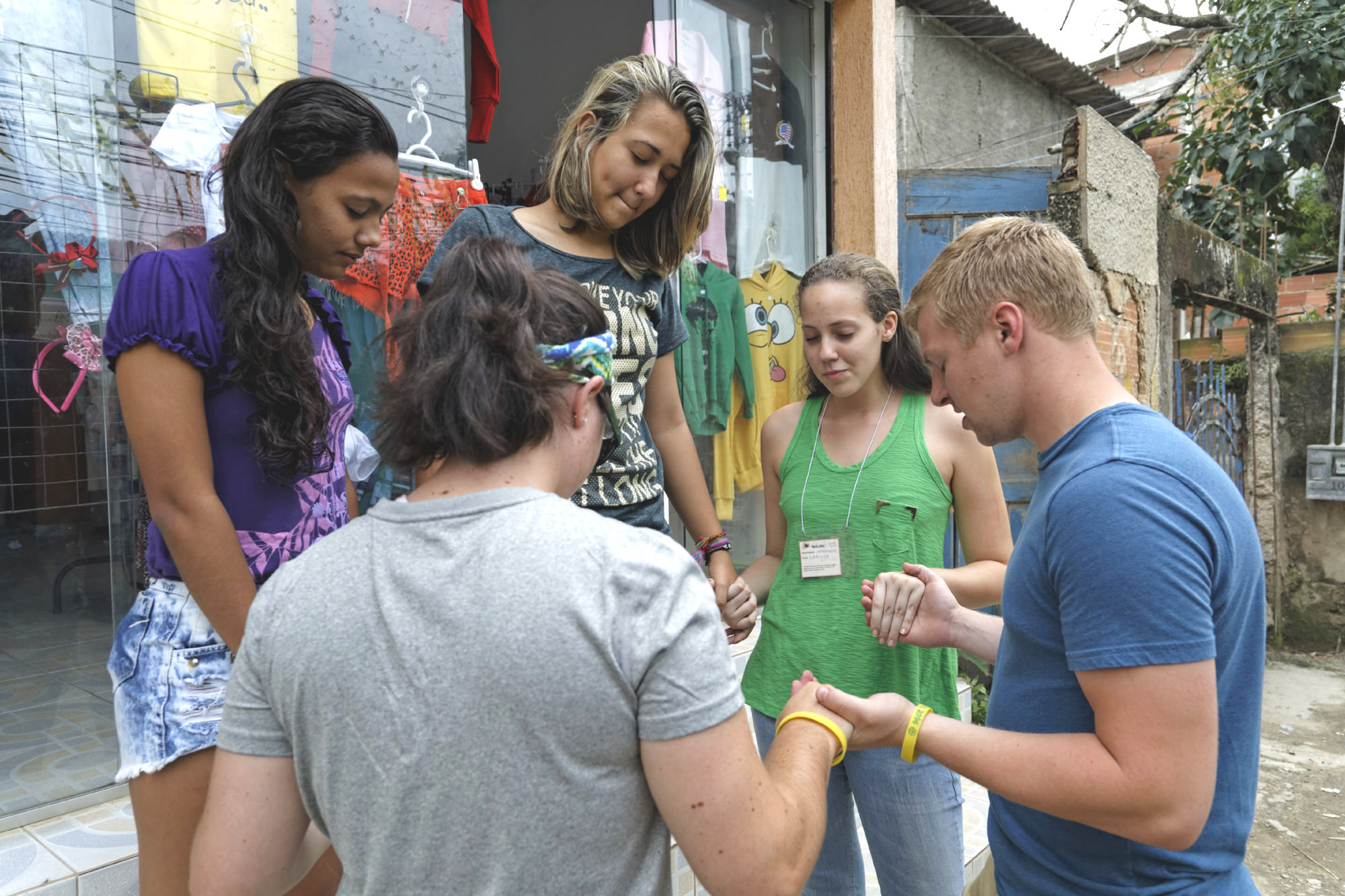
RIO DE JANEIRO (BP) — Jordan O’Donnell is in a hurry. The 21-year-old Virginia Tech senior weaves his way through the sea of raucous futebol (soccer) fans jamming Rio’s streets. But O’Donnell isn’t headed to the match of the day, Ecuador vs. France. Instead, he’s hustling against the crowd, bound for a nearby church to get Bibles for a group of teenage boys with whom he’s just shared the Gospel.
For O’Donnell and a team of 10 Southern Baptist college students, this is the last day of street evangelism near Rio’s Maracanã soccer stadium. It’s been a focal point for outreach as the students partnered with Brazilian Baptists and IMB missionaries to spread the Gospel during the FIFA World Cup, June 12-July 13. But after two weeks of sharing their faith nearly non-stop, it’s time for the students to head home.
That’s why O’Donnell doesn’t want to miss this last opportunity. He figures he’s got about five minutes before the teens get bored with waiting and leave, and with two of them expressing genuine interest in Christ, he’s practically sprinting to the church.
O’Donnell runs ahead of his two ministry partners, Bekah Gordon and Gloria Reese, who struggle to keep up with his rushed pace. Gordon is co-leading the student mission team and recently served as a North American Mission Board semester missionary at Auburn University at Montgomery (Alabama); Reese, 17, lives in Rio and is the daughter of IMB missionaries Eric and Ramona Reese.
Just minutes earlier, the three of them met the teens in front of their school a few blocks from the stadium. O’Donnell shared his testimony and asked the boys if they wanted to live for God. They looked uncertain. One admitted he wants to live for himself; another said he doesn’t know who God is.
As Reese translated between English and Portuguese, Gordon told the boys the easiest way to know God was by reading His Word. “If you’re looking for God, look in the Bible,” she explained, asking each of the four teens if they had access to a Bible. Two did not but said they’d like one. That sent O’Donnell running.
By the time Gordon and Reese reach the street where the church is located, O’Donnell is already making his way back with the Bibles. It’s been more than five minutes, and the trio hurries to where they left the teens. They’re relieved to see the boys are still waiting. O’Donnell puts the Portuguese Bibles into the teens’ hands. “Read this and ask questions,” he tells them. “It changed my life.”
The American students have had dozens of these kinds of conversations during their time in Rio. Overall, they estimate they’ve led more than 100 people to faith in Jesus Christ, simultaneously connecting new believers with local churches where they can be discipled. Many more have heard the Gospel, some for the first time.
It hasn’t been easy. Since the games began, police barricades have moved the students (and anyone else without World Cup tickets) farther and farther from the gates of Maracanã Stadium, making it harder to connect with fans. And, they aren’t the only faith group in town trying to engage people in conversation — Jehovah’s Witnesses man literature stands on street corners around the stadium.
Working together
But the students haven’t done it alone. They’re part of a massive evangelism effort spearheaded by Brazilian Baptists, who’ve enlisted more than 1,800 national volunteers to serve in World Cup-related ministries across the country. More than 300 are stationed in Rio alone.
At the heart of that effort is Igreja Batista Missionária do Maracanã (Maracanã Missionary Baptist Church), which sits about 250 yards from the Maracanã Stadium.
“This is a way of reaching the whole world, because here at Maracanã you have the whole world converging,” Alexandre Silva, the church’s pastor, says.
Because of the numerous short-term missions teams he’s helped host — Brazilians, Argentines, Americans and others — Silva says the multi-national effort reminds him of the day of Pentecost, with so many different languages being spoken on the church grounds.
“We’ve been praying for this for the last four years, that God would use us, that God would bless this effort,” he says. “Our role is to be a blessing and a base to help others.”
Helping churches
But the U.S. students’ evangelism efforts don’t stop when the soccer does. During days when there are no World Cup games scheduled in Rio, the students split into smaller teams to serve with local Brazilian Baptist churches. Some were sent to churches inside Rio’s slums, known as favelas.
The experience was overwhelming for Amanda Fenton and Lee Dymond, who spent five days sharing the Gospel door-to-door in a favela nicknamed Floresta. Fenton, 20, is a junior at the University of Alabama at Tuscaloosa. She says the smell hit her first: marijuana mixed with the stench of human waste running through open sewers. Then there were the drug deals and the guns — lots of guns.
“We’d walk around and see 12-year-olds twirling pistols on their hands,” she says. “They would be yelling, ‘Crack for $10!’ (in the currency of Brazilian reais), or whatever drug they were selling.”
The team was warned to avoid contact with the dealers, but Fenton admits it was hard not to stare. Dymond, who led the student team and serves as campus minister at Auburn University at Montgomery (Alabama), took it a step further. He felt compelled to pray with a group of drug dealers selling crack right outside the church. Dymond says it was like living out Acts 20:24, where Paul describes his life as worthless in comparison with Christ’s charge to spread the Gospel.
“I was nervous. There were nine guys there, and most of them had guns,” he recalls. “I prayed that God would keep them safe long enough to hear the Gospel, and that Jesus would chase after them.”
Police rarely venture into the favelas, and only when heavily armed. Fenton says the church was a sort of safe haven at the heart of Floresta, but even then there was risk. The week before, eight people were killed in a shootout with police near the church.
Despite the danger, Fenton said she never once felt unsafe. IMB missionary Eric Reese, who has extensive experience working in Rio’s favelas, obtained permission from the gang that runs Floresta for the students to work there, assuring gang leaders in a letter that the students weren’t drug spies.
Though she’d never seen that level of poverty, Fenton said the believers at the small Brazilian Baptist church in Floresta inspired her.
“We take it for granted that I can just flip a switch for power (electricity),” she says. “These people are living in deplorable conditions and yet they’re happy; they’re finding joy in Christ.
“At the end, all the church members were giving us a big bear hug,” she adds. “They were so grateful that we were there. I was bawling. That touched my heart.”
Whatever impact her team made, Fenton believes it’s miniscule compared to the effect Floresta’s believers had on the students themselves.
“I’m not dealing with drug dealers (back home like these believers are here), and yet they have this devout faith that this community is going to turn around. How can I not take the little things in my life and put them into God’s hands?” Fenton says.
Dymond echoes her sentiments.
“It has absolutely changed me. I will not be the same,” he says of his time in the favela. “I have never shared the Gospel as openly as I have here — probably 50 times. I’m ready to go back home and start doing there what I did here. There’s no difference.”
For more coverage of World Cup outreach, see the story package, “The Cross at the Cup,” at commissionstories.com/Americas. To learn about global missions opportunities for students through the International Mission Board, go to imbstudents.org.
–30–
Don Graham is an IMB senior writer. Get Baptist Press headlines and breaking news on Twitter (@BaptistPress), Facebook (Facebook.com/BaptistPress) and in your email (baptistpress.com/SubscribeBP.asp).















